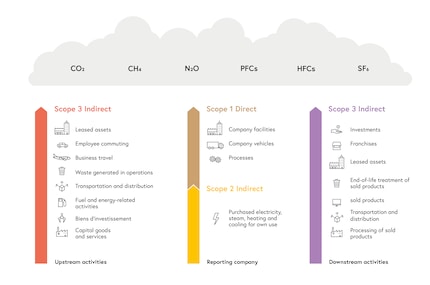
Behind the scenes
Climate neutrality: digitec Galaxus will be at zero emissions starting 2022
by Tobias Billeter

Reducing our climate footprint to net zero by 2050 requires a strict CO2 diet plan. To get rid of all those greenhouse gases, we’ve turned to a science-based weight watcher – the Science-Based Targets Initiative. And they go all in!
January is the month to fast for many. After countless Christmas aperitifs, obligatory feasting and an alcohol-fuelled New Year’s Eve week to round things off, a few solid resolutions for the New Year can’t hurt. The same goes at digitec Galaxus. As early as November 2021, we communicated our decision to at least halve our own emissions within 8 years. And as of Jan. 1, 2022, we will offset 100 per cent of our operational climate footprint. In the new year, we want to be one of the «Biggest Losers» in terms of emissions savings.
The community was very eager to discuss our announcement, leaving over 190 comments below the statement. This is anything but surprising. According to a recent GfK study, published in German, sustainability is the top issue in our part of the world. More than two thirds of Germans demand that companies behave as environmentally conscious as possible. In Switzerland, this percentage is likely similar. Online retailers have plenty of good reasons to act – quickly and decisively. Together with our parent company Migros, we’re committed to an internationally recognised climate diet, the Science-Based Targets Initiative (SBTi). Read on to find out what these four letters stand for, and why their initiative is the right one for us.

The driving forces behind SBTi are international organisations and think tanks that are deeply involved in climate change mitigation. The Carbon Disclosure Project (CDP), the World Resources Institute (WRI) and the WWF are among those involved. They all have proven scientific expertise and have developed methods and established criteria for companies to effectively reduce emissions. Of course, they also check whether companies are achieving their goals.
Science-based Targets (SBTs) are corporate climate targets aligned with the Paris Climate Agreement and based on hard climate science criteria. The initiative surrounds one central question: how can we eliminate as many climate gas emissions as possible from our value chain as quickly as possible – from the extraction of raw materials, through production, sales and delivery, to the disposal of products?
The drastic climate diet plan includes operational (scopes 1 and 2) and non-operational greenhouse gas emissions as well as emissions from the upstream and downstream value chain (scope 3). Costs for the latter are incurred by product manufacturers. In short: we aren’t just working on our love handles, any extra fat has to go. A simple dry January and gentle diet or self-hypnosis aren’t enough. A long-term purification plan with fixed milestones and corresponding checks is needed.
In order for our climate gas fast to be officially recognised and monitored by SBTi scientists, companies propose concrete and detailed reduction targets to the initiators. These are based on their climate footprint collected according to clear criteria, taking into account global developments as well as new scientific findings. A big difference to conventional climate compensation via CO2 certificates lies in the following: reduction targets demanded by SBTi are achieved within the company’s own value chain. In other words: we can’t just significantly cut back on CO2 emissions in our own operations. It’s also up to us to ensure that manufacturers of products sold in our stores aim for a net zero target by 2050.
We’re far from alone in our commitment to SBTi. Well-known suppliers such as Microsoft, Miele and Mammut have already publicly communicated their net zero goal for 2050 and are going on the offensive to achieve the Paris climate targets. And this is urgently needed. After all, over 98% of all climate gas emissions within our value chain occur during product manufacturing.
Making sure employees and media know what's up at Digitec Galaxus is my job. But without fresh air and a lot of exercise, I basically stop functioning. The great outdoors provides me with the energy I need to stay on the ball. Jazz gives me the tranquility to tame my kids.
Everything you'd usually read on a news portal or in the newspaper can be found here, directly from the source: annual figures, new services, our efforts for greater sustainability, sales trends and so on.
Show all